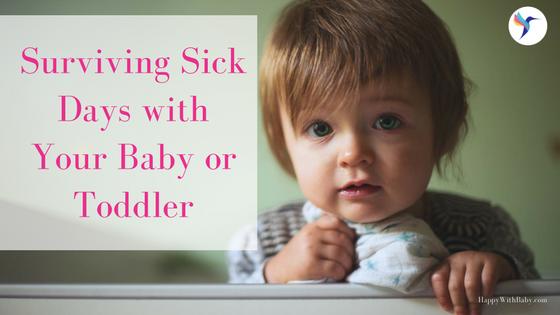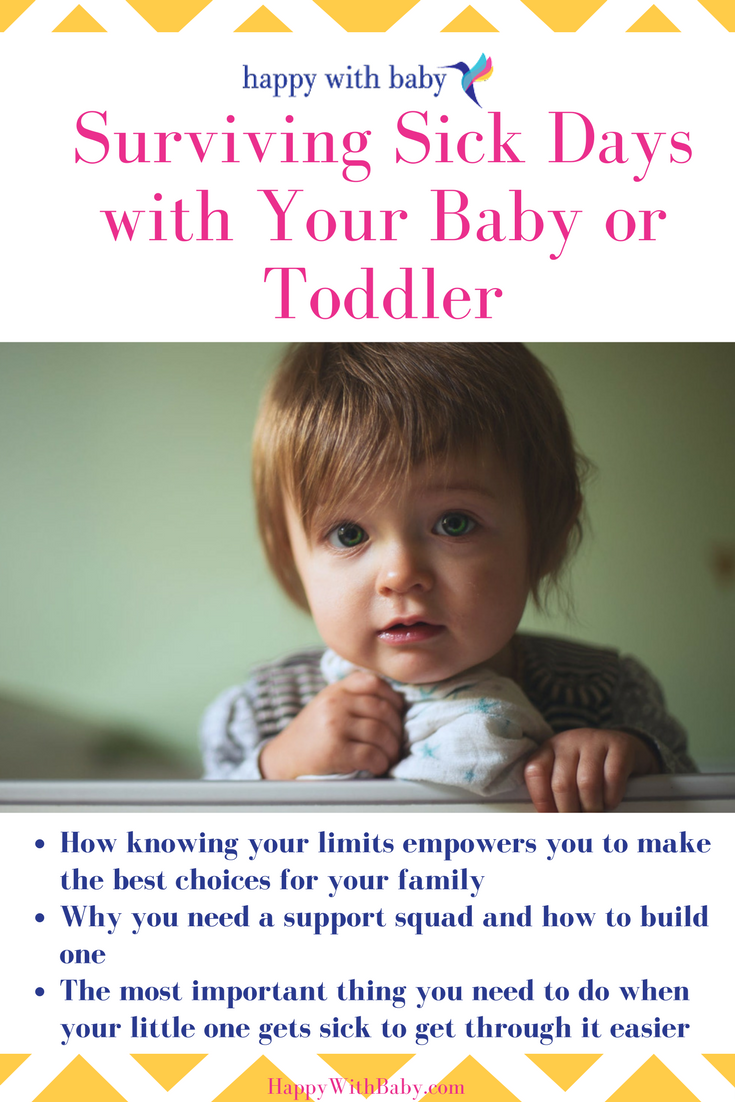Surviving Sick Days with Your Baby or Toddler

Is it just me, or does it seem like this year’s cold and flu season is particularly rough? Lately, it seems like everyone has taken the hit. It has definitely shaken things up a bit at my household already.
In January’s issue of Real Simple magazine, they put out a great article on how to survive sick days. (The advice in it is genius. It’s worth checking out.) But, the focus is mostly on families with older kids.
And it hit me: Why haven’t I talked about sick days with babies and toddlers on the blog before?? So, that’s what I want to dig into now because I think there are some specific things to note when your baby or toddler gets sick.
Know your stance on sickness
For the first couple of months of baby’s life, the typical advice is to be cautious about taking your baby out to places where there are likely to be sick people. Newborns have much more vulnerable systems because they’ve not been vaccinated yet, so it makes sense.
That said, this doesn’t mean you need to stay cooped up in your home all winter. That’s just not realistic.
So, while you might pass on going over to your friend’s house when her kids are sick where the likelihood of someone coughing or kissing on your baby might be likely, there’s no reason why you can’t still take your baby out for walks or enjoy a trip to your favorite coffee shop where no one will be touching them.
Once baby is a bit older--especially once your baby has already had their first cold or sickness and you’ve got a bit of experience under your belt--you’ll have the self-awareness to make pre-emptive decisions based on what feels OK or not OK to you.
Some moms are so laid back about illness: “Kids get sick. It happens. No big deal!” And, for other moms, it really piles on the extra stress and worry.
There’s no right or wrong way to feel or deal with it, but it is good to know what your stance is so that you can make the right choices for your family.
For example, if you know that your employer isn’t all that flexible with sick days or you don’t have extended family around to help, that might make you more cautious about taking your children around other sick people.
Or, if you’ve had an emergency room scare with your little one already, you might understand that those kinds of surprises kick your anxiety into motion and you can use that awareness about yourself to make choices that allow you to feel more empowered.
That might mean you opt out of that birthday party because you heard your nephew still has that cough. Even if the expectation is for you to show up, it can make saying no that much easier.
Know who’s on your support squad
If you’re a working parent, it’s always a good thing to know where your boss stands on sick days. If your boss is flexible with letting you leave when you need to, that is great. If you can work from home, that’s great too.
The same goes for your partner. Is your partner able to leave early to relieve you of your at-home nursing duties so you can go clock in at work for a bit? If not, can your partner at least give you a break when he or she gets home so that you can finally shower in peace?

It would be good to know when interviewing babysitters or nannies what their stance is on caring for sick children.
Your caregiver might take issue with staying with a sick child for any number of reasons, or they might have no problem with it at all, but you never know unless you ask. It’s better to know ahead of time than to find out at the last minute that you don’t have any help for the day.
In-home daycare or daycare centers will have their own standardized policies on illnesses too, which should be clearly communicated with you.
Some daycare centers say that your little one has to be fever- and symptom-free for 24 to 48 hours before returning. But what does symptom-free mean exactly? No running nose? What if they have a cough? These are good questions to clear up with your provider. Also, sometimes your provider can provide back-up sitter recommendations if you aren't able to take off work for whatever reason.
If there ever were a time to rely on delivery or pickup services, this might be it. So, if you can handle the expense, do it.
Some stores like Target and Walmart now offer pickup service on your shopping orders. Some pharmacies do too. Order groceries online if you need to or have dinner delivered. When in doubt, Instacart will go almost anywhere you need them to, do the shopping for you, and deliver within a couple of hours.
I realize we all can’t afford to pay for help though, and that’s why it’s so important to have people in your life that you can call for help.
I talk a lot about building your mom tribe, but I know that process is daunting and can take time. But if nothing else, who can you reach out to for support? If you have friends or family in your area, perfect--ask them in advance how they might be able to pitch in when these times of need come up. Maybe they can pick up some chicken soup for you. Or, if you have more than one child, maybe they can take your other kids to soccer practice so you can stay home with your sick one.
If you don’t have friends and family nearby and you’re still searching for a mom tribe of your own, maybe there are ways you can make connections with other parents just for the logistical support. You don’t have to be best friends necessarily.
If your child goes to daycare or preschool, maybe you can connect with other parents to create a contact list for parents willing to loan out their humidifier or drop off tissues and Pedialyte on their way home from work--with the understanding that you’ll return the favor when they’re in need too!
Do you have any neighbors that you’re friendly with? Can you make connections in a Facebook or Meetup group? It helps to be a little resourceful and do a bit of networking. We’re not meant to do this alone.
Create a sick day survival kit
Think about what has helped you in the past or ask other moms what they swear by. Keep it stocked and ready to go, so that you don’t need to make extra trips to the pharmacy. And after you all recover from each bout of sickness, make sure you add what needs to be restocked to your next shopping list.
Your kit might include:
-
Thermometer
-
NoseFrida and replacement filters. (Many moms and doctors love the NoseFrida nasal aspirator, rather than the usual bulb ones they give you at the hospital.)
-
Nasal saline spray
-
Tissues
-
Aquaphor
-
Pedialyte
-
Antibacterial wipes
-
Infant/toddler medicines
-
Infant/toddler medicine dispenser
-
Baby-safe chest rub
-
Epsom salts for the bath
-
Humidifier
-
Your list of contact people for support
-
Your list of delivery services
Shift your expectations
This is a big one. If you only have one takeaway from this blog post, please let this be it. Sick days happen. There’s no avoiding it forever. And when it happens, try to keep perspective about what matters most.
The dishes and laundry might pile up while you snuggle your sick little one. You might get a little behind at work. You might be wearing vomit on your sweater and your hair might not get washed for a few days. You might even catch a cold yourself. It’s OK. You’ll get caught up eventually.
Worrying over all the other stuff you need to do isn’t going to help you get the work done or help your little one to get healthier. Just be where you are right now, take care of yourself and your family, and take a break when you can.
Subscribe
Sign up to get the latest weekly blogs sent straight to your inbox


0 comments
Leave a comment
Please log in or register to post a comment